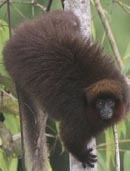Get
To Know
|
 The
Brown Titi Monkey is a New
World primate who lives
in the northern Amazon rainforest of Colombia to Brazil and Peru.
They have a head and body length of 23-46 centimetres and a tail
which is longer than the head and body. The tail is always furry
and is not prehensile. Diurnal and arboreal, titis predominantly
prefer dense forests near water. They easily jump from branch to
branch, earning them their German name, Springaffen (jumping monkeys).
They sleep at night, but also take a midday nap. Titis are territorial.
They live in family groups that consist of parents and their offspring,
about two to seven animals in total. They defend their territory
by shouting and chasing off intruders, but rarely engage in actual
fighting. Their grooming and communication is important for the
co-operation of the group. They can typically be seen in pairs sitting
or sleeping with tails entwined. They
eat mainly fruits, although they also eat leaves, flowers, insects,
bird eggs and small vertebrates.
Titis
are monogamous, mating for life and the female bears a single young
after about a five-month gestation. Twins occur rarely, having been
documented in only 1.4% of all births. While the second infant usually
does not survive, cases where neighbouring groups have adopted infants
are known, suggesting that twins may be reared successfully under
certain circumstances. Often it is the father who cares for the
young, carrying it and bringing it to the mother only for nursing. The
Brown Titi Monkey is a New
World primate who lives
in the northern Amazon rainforest of Colombia to Brazil and Peru.
They have a head and body length of 23-46 centimetres and a tail
which is longer than the head and body. The tail is always furry
and is not prehensile. Diurnal and arboreal, titis predominantly
prefer dense forests near water. They easily jump from branch to
branch, earning them their German name, Springaffen (jumping monkeys).
They sleep at night, but also take a midday nap. Titis are territorial.
They live in family groups that consist of parents and their offspring,
about two to seven animals in total. They defend their territory
by shouting and chasing off intruders, but rarely engage in actual
fighting. Their grooming and communication is important for the
co-operation of the group. They can typically be seen in pairs sitting
or sleeping with tails entwined. They
eat mainly fruits, although they also eat leaves, flowers, insects,
bird eggs and small vertebrates.
Titis
are monogamous, mating for life and the female bears a single young
after about a five-month gestation. Twins occur rarely, having been
documented in only 1.4% of all births. While the second infant usually
does not survive, cases where neighbouring groups have adopted infants
are known, suggesting that twins may be reared successfully under
certain circumstances. Often it is the father who cares for the
young, carrying it and bringing it to the mother only for nursing.
|
|
|
|
Miss Blanton, Teacher
By
Joan Mazza
I've been a teacher all my adult life. Never married,
so I feel like I've raised the children of this county.
Taught here at Lost Lake Elementary over fifty years.
Three generations in some families. Latest Price kids
had it hardest with their mama's puzzling exit
when they were so young. Some say she died
by her own hand. Darcy doesn't say.
Of course the eldest two, Sarah and Jamaica,
took to mothering the little ones with stable guidance
from Aunt Lou. She's been a gift. You never heard her
once complain, not even about Darcy's commands
or speak ill of him when he was hard on the children.
The Price girls are born with a resilience their father
can't beat out of them. His boys falter and wobble
like runts in a feral litter. The tragedy of Hector's
death so soon after their mama's departure
was another blow. Silas took an additional thump
when his father Darcy forced him to slaughter
that sow that had been his piglet pet. Silas lost
his sweetness after that.
Men think violence makes them strong. I think
it only makes them more inclined to violence.
Like Silas with his sights on the military, hoping
for some glory and a medal. Cora, the youngest,
is the one to watch. Some day she'll write their story
and won't be afraid to tell the truth.
Maybe I've said too much already.
In small towns, people talk and talk.
I'm as guilty as the next one.
Joan Mazza has worked as a medical microbiologist, psychotherapist, sex
therapist, writing coach and seminar leader. She is the author of six
books, including Dreaming Your Real Self (Penguin/Putnam 1998),
and her work has appeared in Potomac Review, Rattle, Off the Coast,
Kestrel, Permafrost, Slipstream, Timber Creek Review, The MacGuffin, Writer’s
Digest, The Fourth River, the minnesota review, New Verse News, Personal
Journaling, and Playgirl. She now writes poetry and does fabric
art in rural central Virginia. www.JoanMazza.com.
|
 The
Brown Titi Monkey - Issue Fourteen
The
Brown Titi Monkey - Issue Fourteen